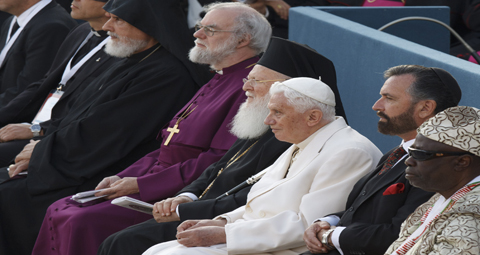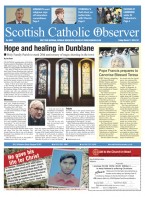February 1 | ![]() 0 COMMENTS
0 COMMENTS ![]() print
print

Ecumenism is our neglected mandate
— Despite considerable good will and genuine effort, Christian denominations need to work at praying for each other
Fr Ronald Rolheiser
While saying farewell the night before He died, Jesus told those with Him that He ‘had other sheep that are not of this fold’ and that those with Him at that particular moment were not His only followers. Very importantly, He also said that He longed for unity with those others just as urgently and deeply as He longed for unity with those in the room with Him.
Among other things, this means that no matter what our particular Christian denomination, we are not Christ’s only followers and that we have no more right to His love than those millions of others who are not of our own kind. Moreover, to be a disciple of Jesus means that we, like Him, also have to hunger and pray for unity with those who are separated from us. Indeed the divisions among us as Christians, the fact that we are divided into more than a hundred separate denominations and the fact that, within these denominations, we are further bitterly divided by ideologies and live in distrust of each other, constitutes perhaps the biggest of all scandals that Christianity has given and continues to give to the world.
For the most part, despite considerable good will and genuine effort in recent years, we are still not praying for each other and reaching out to each other with any real heart. The relationship between Christian denominations today, and often inside of those denominations themselves, is characterised more by re-entrenchment than by openness, distrust than by trust, disrespect than by respect, demonisation than by empathy, and lack of charity than by courtesy and graciousness. Sadly, too, more so than by ecumenical hunger and openness, our churches are characterised too much by a self-sufficiency and smugness that says: “We have the truth. We have no need of you!”
But who are our real brothers and sisters as Christians? Is it those within our own particular denomination? Perhaps, though perhaps not. Several times during His ministry while Jesus was talking to a group of people, someone approached Him and told Him that His mother and His family were outside the circle of this particular group, wanting to talk to Him. Jesus’ reply is far-reaching: In each case, He responds with a question: “Who is my mother? Who are my brothers and sisters?” And He answers His own question by saying: “Those who hear and keep the Word of God are mother, and brother, and sister to me.”
In a society where blood relationship meant everything, this statement is a stunning one. Blood may be thicker than water but, Jesus asserts, Faith is thicker than blood. Faith is the real basis for family. It trumps biology. Moreover, without straining the logic, implied in this too is that faith also trumps denomination. Who is your real brother or sister as a Christian? Your fellow Roman Catholic? Your fellow Presbyterian? Your fellow Lutheran? Your fellow Baptist? Your fellow Evangelical? Your fellow Methodist? Your fellow Anglican or Episcopalian? Clearly, for Jesus, it is the person who most deeply hears the Word of God and keeps it, irrespective of denomination. Christian discipleship is defined more by the heart than by a particular church membership card.
This makes for a non-negotiable mandate within our Christian discipleship: We need to radiate Jesus’ hunger for intimacy with all people of sincere faith and, to that end, our actions towards those outside our own religious circle must always be marked by respect, graciousness, and charity—and a genuine signal that we hunger for unity with them.
Genuine respect, graciousness, and charity can only be predicated on a humility that believes that our own church, whatever our denomination, does not have the whole truth, that we are not free of error, that we are not free of sin, and that we are not fully faithful to the Gospel. All of us, all Christian churches, are journeying towards fullness, towards a full understanding of the truth, and towards a more radical and honest fidelity to what Jesus asks of us. None of us has arrived. All of us are journeying still towards where we are called.
Thus, our real ecumenical task, no matter our denomination, is not that of trying to win over converts or convince others that we are more right than they are. Our primary task is inner conversion within our own denomination. Our primary task is to try, as individuals and as churches, to be more faithful to the Gospel. If we do that we will eventually come together, as one church, under Christ because as we all go deeper into the mystery of Christ and grow more deeply in our own intimacy with Jesus, we will (in the beautiful phrase of Avery Dulles) ‘progressively converge,’ eventually meet around one centre and one person, Jesus Christ.
Kenneth Cragg, after spending years as a Christian missionary to Islam, suggested it will take all the Christian churches to give full expression to the full Christ. Clearly all of us still need to stretch our hearts.
—Fr Ronald Rolheiser is a Catholic priest and member of the Missionary Oblates of Mary Immaculate. He is president of the Oblate School of Theology in San Antonio, Texas. Visit his website at http://www.ronrolheiser.com











